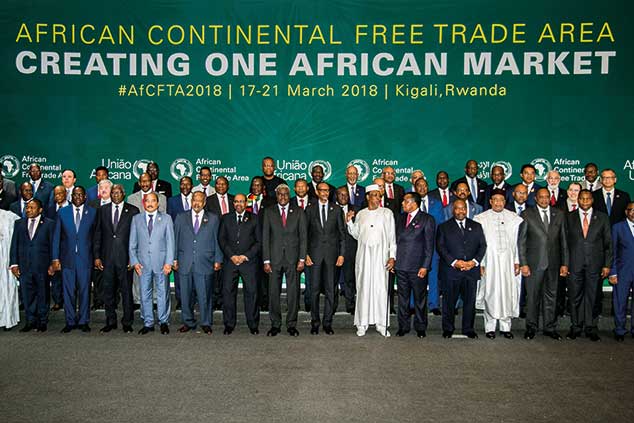As the African Union proposes an African free trade area, Emmanuel Young examines the opportunities and potential pitfalls presented by the scheme.
October 1st marked the start of Black History Month – a month in which we recognise the contributions that people of African and Caribbean descent have made to our country. However, whilst it is important to reflect and learn from the history of the Afro-Caribbean community in the UK and around the world, it is arguably even more important to look to its future.
This is precisely what the African Union (A.U.) has done with the proposition of a pan-African free trade area (FTA) that aims to liberalise trade and the movement of people on the African continent to the benefit of all 55 African nations. But before we look into those benefits, let’s take a look at the detail of proposed FTA.
The African Continental Free Trade Area (AfCFTA) is an FTA proposed by the African Union that will: reduce 90% of all tariffs on the Continent, remove all barriers to the free movement of African people between African nations, harmonize regional and international trade policy and, create several pan-African institutions (including a secretariat, an assembly of African leaders, a council of ministers, a dispute settlement body, and various committees) to ensure the implementation of the rules of the area.
If successful, AfCFTA will be the first of its kind on the Continent and the largest of its kind in the world; representing 1.2 billion people and 55 economies with a total gross domestic product (GDP) of $2.5 trillion.
Moreover, the A.U. predicts several benefits that may arise out of its implementation. Firstly, it is predicted that intercontinental trade will increase by 43%. Currently, only 17% of the goods traded by African nations go to other African countries compared with over 50% of Asian goods with other Asian countries and 70% of European goods with other European countries within the European Union.
Secondly, the cost of transporting goods between African countries will be dramatically reduced. It currently costs six times more to transport goods between neighbouring countries Chad and Cameroon than in costs to transport goods between Chad and Hong Kong!
Finally, there is hope that the liberalisation of borders on the Continent will attract foreign direct investment from more developed countries, and potentially even turn some African countries into trade hubs for the region.
All of this, the AU estimates, will result in a 1% – 3% growth in GDP on average for each economy as a direct result of AfCFTA.
However, as Amaka Anku (Africa head for Eurasia Group) points out, there are always winners and losers with these types of arrangement. China, a big player in Africa at the moment, could find it easier to flood African nations with cheap Chinese goods masquerading as African goods which could decimate African industry.
Furthermore, there is no doubt that Africa’s elite (a large section of which are corrupt to the core) will find a way to exploit AfCFTA to their benefit.
Additionally, many have argued that Africa isn’t yet ready to support such an ambitious trading arrangement as it lacks the basic infrastructure, such as roads, rail networks and internet, that is needed to facilitate free trade. Taking this into account, predicted increases in intercontinental trade may not materialise as expected.
Moreover, African governments do not have the resources to deal with any mass economic migration that may take place as people become free to move to wealthier African nations.
Although the AfCFTA is ambitious in its aims, these are the problems for which solutions must be found in order for African nations to fully realise its benefits.
If found however, this could be the first step in rectifying the legacy of colonisation which left African nations trading more with their former colonisers than with their own neighbours.
What a way to start off Black History Month 2019, ey?
Image: [MoneyWeek.com]

